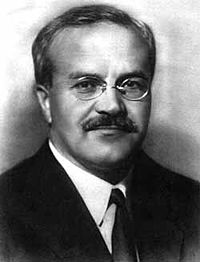Vyacheslav Molotov Politician
Vyacheslav Mikhailovich Molotov (/ˈmɒləˌtɔːfˌ-ˌtɒf, ˈmoʊlə-ˌˈmɔː-/; Russian: Вячесла́в Миха́йлович Мо́лотов [vʲɪtɕɪˈslav mʲɪˈxaɪləvɪtɕ ˈmolətəf]; 9 March [O.S. 25 February] 1890 – 8 November 1986) was a Soviet politician and diplomat, an Old Bolshevik, and a leading figure in the Soviet government from the 1920s, when he rose to power as a protégé of Joseph Stalin. Molotov served as Chairman of the Council of People's Commissars (Premier) from 1930 to 1941, and as Minister of Foreign Affairs from 1939 to 1949 and from 1953 to 1956. He served as First Deputy Premier from 1942 to 1957, when he was dismissed from the Presidium of the Central Committee by Nikita Khrushchev. He retired in 1961 after several years of obscurity.Molotov was the principal Soviet signatory of the Nazi-Soviet non-aggression pact of 1939 (also known as the Molotov-Ribbentrop Pact), whose most important provisions were added in the form of a secret protocol that stipulated an invasion of Poland and partition of its territory between Germany and the Soviet Union. This effectively sealed the beginning of World War II and made the Soviet Union an unofficial ally of Nazi Germany in the period from 1939 until the German invasion in 1941. During this period, Molotov knew of the Katyn massacre committed by the Soviet authorities. Following the end of World War II (Great Patriotic War), Molotov was involved in negotiations with the Western Allies, where he became noted for his diplomatic skills. He kept his place as a leading Soviet diplomat and politician until 1949. In March 1949, after losing Stalin's favor, he lost the foreign affairs ministry leadership to Andrei Vyshinsky. Molotov's relationship with Stalin deteriorated further, with Stalin complaining about Molotov's mistakes in a speech to the 19th Party Congress. However, after Stalin's death in 1953, Molotov was staunchly opposed to Khrushchev's de-Stalinization policy. Molotov defended the policies and legacy of Stalin until his death in 1986, and harshly criticised Stalin's successors, especially Nikita Khrushchev.
Personal facts

| Alias (AKA) | Молотов Вячеслав |
|---|---|
| Birth date | March 09, 1890 |
| Birth place | |
| Nationality | |
| Date of death | November 08, 1986 |
| Place of death | |
| Spouse |
Search
Office holder
| office | Minister of Foreign Affairs Member of the Orgburo Chairman of the Council of People's Commissars of the Soviet Union Member of the Secretariat Responsible Secretary of the Russian Communist Party Candidate member of the 10th 12th 13th Politburo First Deputy chairman of the Council of Ministers of the Soviet Union Full member of the 14th 15th 16th 17th 18th 19th 20th Presidium |
|---|---|
| party | |
| successor |
Topical connections
Vyacheslav Molotov on Wikipedia
External resources
- http://alsos.wlu.edu/qsearch.aspx?browse=people/Molotov,+Vyacheslav
- http://historicalresources.org/2008/08/26/molotov-reaction-to-german-invasion-of-1941
- http://scholar.google.com/scholar?hl=en&q=Vyacheslav+Molotov&btnG=&as_sdt=1%2C27&as_sdtp=
- https://archive.org/details/TheMeaningOfTheSoviet-germanNon-aggressionPact